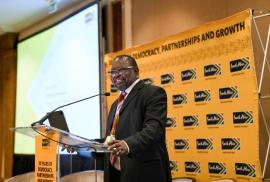
Finance Minister Enoch Godongwana has reaffirmed South Africa’s commitment to engaging in structural reforms that will foster an environment fertile to economic growth and competitiveness.
The Minister was speaking during a panel discussion at the World Economic Forum (WEF) Annual Meeting held in Davos, Switzerland.
Godongwana is leading the South African delegation to the critical meeting.
Structural reforms in South Africa are targeted at – among other things – electricity, infrastructure, water and logistics, and are driven by Operation Vulindlela.
Operation Vulindlela is a joint initiative of the Presidency and National Treasury to accelerate the implementation of structural reforms and support economic recovery. It aims to modernise and transform network industries, including electricity, water, transport and digital communications.
The objectives of the reforms are aimed at:
- Stabilising the electricity supply.
- Reducing the cost and increasing the quality of digital communications.
- Providing sustainable water supply to meet demand.
- Providing competitive and efficient freight transport.
- Fostering a visa regime that attracts skills and grows tourism.
“There are a number of things we are doing to deal with structural reforms. One of the perennial problems we’ve had has been on the energy front. Massive structural reforms… are dealing with that question.
“A new challenge has been the logistics sector, where we are investing a lot in it. We have been trying to change the skills composition to the extent that we don’t have and we have provided an environment where we can import skills with ease.
“So there are lot of structural reforms that we have engaged in in order to make sure that we can grow the economy and be competitive,” Godongwana told the panel.
Historical commitment
During the pre-WEF media breakfast briefing held last week, Godongwana emphasised that structural reforms remain crucial.
“Structural reforms remain crucial to revive medium-term growth prospects amid a constrained policy space. We remain steadfast in carrying out structural reforms to support and accelerate economic recovery.
“As government, we remain resolved to deal with the energy and logistics challenges that are adversely impacting our economy,” he said.
In his Medium Term Budget Policy Statement delivered in November last year, Godongwana presented the reforms specifically targeted at Eskom and Transnet.
On Transnet, he said: “Rail underperformance is estimated to have cost up to 5% of GDP in 2022, with losses in the region of R50 billion in the minerals sector alone.
“Given the scale of the challenges, the National Logistics Crisis Committee was instituted to broaden reforms in the sector and prioritise reforms aimed at resolving the immediate crisis, while also addressing the structural aspects hampering the sector.”
On electricity, Godongwana said: “[We] recognise the potential loss of revenue due to private electricity generation, and the fact that traditional revenue models relied on by public entities like Eskom, face serious disruption.
“It is for these reasons that our electricity reforms are holistic, evidenced-based, and geared to find a balanced solution to our electricity supply challenges. They take into account not just a particular entity but the transformation of the sector as a whole.” – SAnews.gov.za


